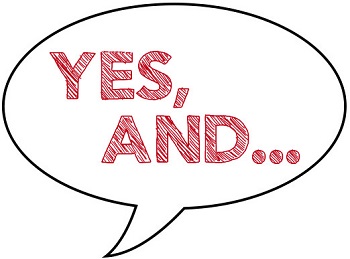Yes, and Not Either/Or #77
Many people have heard of the both/and theory. In improv they call it “yes, and.” It’s the same principle. When ideating, working with a team and getting the creativity going, the best way to encourage participation, vulnerability and engagement is “yes, and.”
Recently, I had the opportunity to participate in a team of leaders. We all knew each other, and most of us own our own companies. You know what that means? We’re not always great teammates! We’re used to being in charge, setting the pace and making things happen. If you’re fiercely independent and used to being in charge, this may resonate with you.
When offered the opportunity to collaborate on a short timeline with three different scenarios in an improv situation, I learned a lot.
One key take-away: don’t kill the mojo. When one person puts themselves out there and offers an idea, this is where yes, and comes in. As soon as the idea is shared, if you’re on their team, your response should be yes, and _____________ (fill in the blank). You build upon the idea until you can take action or change direction as the yes, and-ing continues.
If you don’t like the idea, do NOT say things that kill the momentum. ESPECIALLY if you don’t have an idea of your own to offer. Ideators such as myself will shut down when you offer a statement which in a direct or indirect way says “no, but I don’t have a better idea, I just don’t like yours.” Of course, people offer these statements in many politically correct and socially acceptable ways, but it doesn’t change the impact. Mojo is killed, creativity stops, and predictability ensues. Greatness will not be available from here.
After observation, I realized our team had two very analytical people on it, and they were focused on “how” we would do whatever was suggested before we had determined our objective, while it was still an idea waiting to be considered, not fully thought out. Our objective, once decided, would include our what and why. This structure would create freedom or free creativity. Minus the objective, you can flounder around in thousands of “hows” without accomplishing much.
For me, this is a buzz kill. I’m rarely attached to my ideas in these scenarios, but if someone offers nothing except the fact that they don’t like something offered or don’t agree with, understand or aren’t comfortable with the idea without exploring or offering another idea, I’m out.
Creativity thrives once you can set the objective and build toward it. Once you’ve done that, feel free to determine all the “hows” you can handle.
